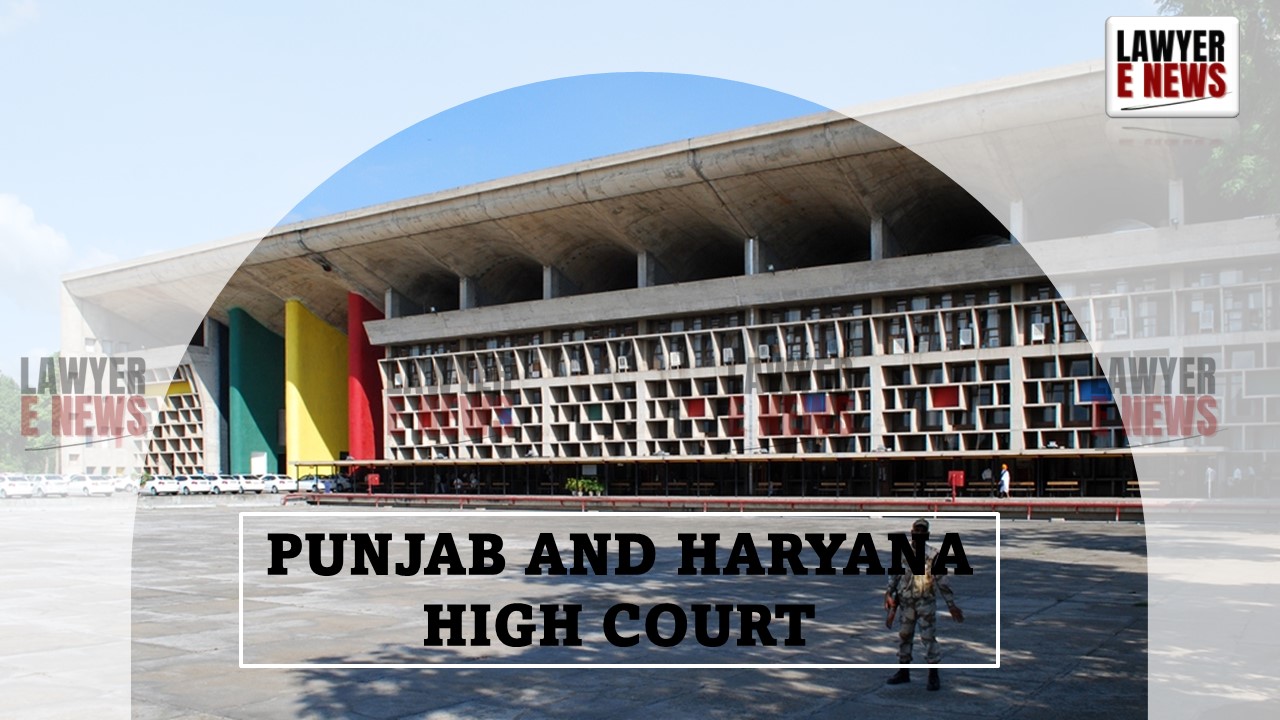-
by Admin
15 February 2026 5:35 AM



Custody Parole for Six Hours Balances Family Obligations and Public Safety: Punjab and Haryana High Court denied a petition for emergency parole filed by Kuldeep alias Balkar, a convict serving a life sentence under multiple sections of the Indian Penal Code (IPC), including Section 302 (murder). The court held that the petitioner’s prior criminal conduct during earlier paroles made him unsuitable for temporary release under the Haryana Good Conduct Prisoners (Temporary Release) Act, 2022. However, in a balancing approach, the court granted six hours of custody parole under police supervision to allow the petitioner to attend his daughter's marriage.
Justice Amarjot Bhatti observed, “The right to parole is a statutory concession, not an absolute right, especially for prisoners whose past conduct casts doubts on their suitability for release. Custody parole serves as a reasonable compromise to allow the petitioner to fulfill his family obligations while ensuring public safety.”
The petitioner, Kuldeep alias Balkar, was convicted in FIR No. 115/2010 under Sections 148, 302, 307, 324, 323, 395, and 447 of the IPC, along with provisions of the Arms Act, and sentenced to life imprisonment on March 30, 2013. He is currently serving his sentence in District Jail, Karnal.
Kuldeep filed the writ petition under Article 226/227 of the Constitution of India, seeking emergency parole for ten weeks to attend the marriage of his daughter, scheduled for December 5, 2024. His application for parole was rejected on November 3, 2024, by the Superintendent of District Jail, Karnal, citing his categorization as a “hardcore prisoner” under Section 2(1)(g)(vi) of the Haryana Good Conduct Prisoners (Temporary Release) Act, 2022.
The petitioner argued that his family had already submitted an undertaking and that the marriage was a significant family obligation. He claimed that the rejection of parole was arbitrary and contrary to Section 5 of the 2022 Act, which provides for emergency parole in cases such as a daughter’s marriage.
Respondent’s Arguments and Status Report
The State opposed the petition, citing the petitioner’s adverse conduct during prior paroles:
The petitioner was released on special parole during the COVID-19 pandemic on March 4, 2020, but he committed offenses leading to FIR No. 213/2020 (under Sections 341, 364-A, and 34 of the IPC and Section 25 of the Arms Act) and FIR No. 304/2020 (under Section 25 of the Arms Act).
He was re-arrested before the parole period ended.
In 2021, the petitioner was granted parole for six weeks for agricultural purposes. During this period, he was implicated in FIR No. 373/2021 under Sections 392, 482, and 120-B of the IPC in Uttar Pradesh.
The petitioner was categorized as a “hardcore prisoner” under Section 2(1)(g)(vi) of the 2022 Act, which excludes prisoners with a record of criminal activity during prior paroles from temporary release.
Public Safety Concerns:
The State emphasized that releasing the petitioner on parole could pose a threat to public safety, given his history of reoffending.
The court reiterated that parole is not an absolute right but a statutory concession granted at the discretion of the authorities. Justice Bhatti noted, “Parole is intended to allow prisoners to maintain continuity with their family and fulfill social obligations. However, it is subject to the prisoner’s conduct and the discretion of the authorities under the statutory framework.”
The court observed that the petitioner’s past misuse of parole weighed heavily against his application for temporary release.
The petitioner’s classification as a “hardcore prisoner” under Section 2(1)(g)(vi) of the Haryana Good Conduct Prisoners (Temporary Release) Act, 2022, was central to the denial of parole. This section disqualifies prisoners who engage in criminal activities during parole from being granted temporary release.
The court found that the petitioner’s record of committing offenses during prior paroles justified his categorization as a hardcore prisoner and rendered him ineligible for parole.
Acknowledging the significance of attending his daughter’s marriage, the court granted custody parole for six hours on December 5, 2024. The court emphasized that this decision balanced the petitioner’s family obligations with concerns about public safety.
Justice Bhatti stated, “Custody parole, with police supervision, ensures that the petitioner can fulfill his family duties without compromising public safety. This limited concession serves the dual purpose of upholding the law and respecting family commitments.”
The court clarified that while parole is a discretionary relief, it must align with the statutory framework and the prisoner’s conduct. The court found no arbitrariness in the rejection of the petitioner’s parole application, as it was based on a detailed assessment of his past behavior and statutory provisions.
The court denied the petitioner’s request for ten weeks of emergency parole but granted custody parole for six hours (excluding travel time) on December 5, 2024, to attend his daughter’s marriage. The court directed the police to escort the petitioner in plain clothes during the custody parole period to ensure a dignified participation in the ceremony.
This ruling underscores the judicial balance between upholding public safety and respecting a prisoner’s family obligations. While reaffirming that parole is a statutory privilege subject to discretion, the court’s decision to grant custody parole reflects its sensitivity to the petitioner’s familial responsibilities.
Date of Decision: December 3, 2024
